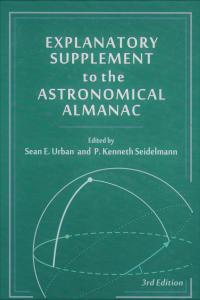Explanatory Supplement to the Astronomical Almanac
Explanatory Supplement to the Astronomical Almanac
By: Sean E. Urban, P. Kenneth Seidelmann
This book offers explanatory material, supplemental information, and detailed descriptions used to produce The Astronomical Almanac, an annual publication prepared jointly by the US Naval Observatory and Her Majesty's Nautical Almanac Office in the UK.
For all sales outside of the United States, please contact Felicity Henson, fhenson@aip.org
Title information
The Explanatory Supplement to the Astronomical Almanac offers explanatory material, supplemental information, and detailed descriptions of the computational models and algorithms used to produce The Astronomical Almanac, which is an annual publication prepared jointly by the US Naval Observatory and Her Majesty’s Nautical Almanac Office in the UK. Like The Astronomical Almanac, The Explanatory Supplement provides detailed coverage of modern positional astronomy. Chapters are devoted to the celestial and terrestrial reference frames, orbital ephemerides, precession, nutation, Earth rotation, and coordinate transformations. These topics have undergone substantial revisions since the last edition was published in 1992. Astronomical positions are intertwined with timescales and relativity in The Astronomical Almanac, so related chapters are provided in The Explanatory Supplement. The Astronomical Almanac also includes information on lunar and solar eclipses, physical ephemerides of solar system bodies, and calendars, so The Explanatory Supplement expounds upon each of these topics as well. The book is written at a technical, but non-expert level. As such, it provides an important reference for a full range of users including astronomers, engineers, navigators, surveyors, space scientists, and educators.
1. Introduction to Positional Astronomy
2. Relativity for Astrometry, Celestial Mechanics and Metrology
3. Time
4. The Fundamental Celestial Reference System
5. Terrestrial Coordinates and the Rotation of the Earth
6. Precession, Nutation, and Earth Rotation
7. Positions
8. Orbital Ephemerides of the Sun, Moon, and Planets
9. Planetary Satellites and Rings
10. Physical Ephemerides
11. Eclipses of the Sun and Moon
12. Astronomical Phenomena
13. Stars and Stellar Systems
14. Computational Techniques
15. Calendars
Appendices
Acronyms
Glossary
Index
|
“Careful measurements have always been the key to mastery of planetary and stellar dynamics and the cosmic distance scale. The material detailed in this book is the very bedrock underlying much else that we know about our own solar system and beyond.” |

